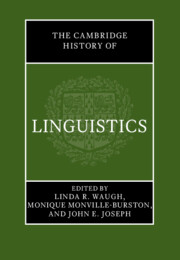Book contents
- The Cambridge History of Linguistics
- The Cambridge History of Linguistics
- Copyright page
- Dedication
- Contents
- Figures
- Tables
- Contributors
- Preface
- Acknowledgments
- Abbreviations, Acronyms, Special Symbols, and Other Conventions
- Introduction
- Part I Ancient, Classical, and Medieval Periods
- Introduction To Part I The Emergence of Linguistic Thinking within Premodern Cultural Practices
- 1 Ancient Near Eastern Linguistic Traditions: Mesopotamia, Egypt
- 2 East Asian Early Linguistic Traditions: China; Korea and Japan
- 3 History of Linguistic Analysis in the Sanskrit Tradition in Premodern India, with a Brief Discussion of Vernacular Grammars
- 4 Greek Linguistic Thought and its Roman Reception
- 5 Early to Late Medieval Europe
- 6 Near Eastern Linguistic Traditions
- 6A The Syriac Linguistic Tradition
- 6B The Hebrew Linguistic Tradition
- 6C The Arabic Linguistic Tradition
- Part II Renaissance to Late Nineteenth Century
- Part III Late Nineteenth-through Twentieth-Century Linguistics
- Part IIIA Late Nineteenth Century through the 1950s: Synchrony, Autonomy, and Structuralism
- Part IIIB 1960–2000: Formalism, Cognitivism, Language Use and Function, Interdisciplinarity
- References
- Index
4 - Greek Linguistic Thought and its Roman Reception
from Part I - Ancient, Classical, and Medieval Periods
Published online by Cambridge University Press: 20 July 2023
- The Cambridge History of Linguistics
- The Cambridge History of Linguistics
- Copyright page
- Dedication
- Contents
- Figures
- Tables
- Contributors
- Preface
- Acknowledgments
- Abbreviations, Acronyms, Special Symbols, and Other Conventions
- Introduction
- Part I Ancient, Classical, and Medieval Periods
- Introduction To Part I The Emergence of Linguistic Thinking within Premodern Cultural Practices
- 1 Ancient Near Eastern Linguistic Traditions: Mesopotamia, Egypt
- 2 East Asian Early Linguistic Traditions: China; Korea and Japan
- 3 History of Linguistic Analysis in the Sanskrit Tradition in Premodern India, with a Brief Discussion of Vernacular Grammars
- 4 Greek Linguistic Thought and its Roman Reception
- 5 Early to Late Medieval Europe
- 6 Near Eastern Linguistic Traditions
- 6A The Syriac Linguistic Tradition
- 6B The Hebrew Linguistic Tradition
- 6C The Arabic Linguistic Tradition
- Part II Renaissance to Late Nineteenth Century
- Part III Late Nineteenth-through Twentieth-Century Linguistics
- Part IIIA Late Nineteenth Century through the 1950s: Synchrony, Autonomy, and Structuralism
- Part IIIB 1960–2000: Formalism, Cognitivism, Language Use and Function, Interdisciplinarity
- References
- Index
Summary
This chapter takes an evolutionary perspective on Greek linguistic thought and ends with consideration of the Roman grammatical tradition. It looks at important steps in Greek conceptualization and the terminology linked to it. Under phonic conceptualizing the author studies the development of scripts, the categorization of sounds according to +/- features and the absence of a functional distinction between letter and sound. Regarding morphosyntactic conceptualization, Plato’s (and Aristotle’s) two elements of discourse structure, onómata and rhḗmata (roughly nouns and verbs) are discussed, and also Aristotle’s parts of speech, his division of categories ‘providing signification’ and those that don’t, and the antithesis between nature and convention. The author highlights the Stoics’ fundamental recognition of six parts of speech and presents Greek grammarians’ views on processual aspects of onómata and rhḗmata, i.e., ptôsis/klísis (similar to modern ‘inflection/case’). Greek influence on Latin grammarians and Varro’s lexical choices for translating Greek terminology are reviewed. It is emphasized that Dionysus Thrax’s Techne grammatike was the most influential handbook of language analysis in Late Antiquity and comes close to what we would call a grammar. Finally, Donatus’ Ars grammatica and its long-lasting impact on language study in the West are discussed.
Keywords
- Type
- Chapter
- Information
- The Cambridge History of Linguistics , pp. 102 - 143Publisher: Cambridge University PressPrint publication year: 2023
- 2
- Cited by

